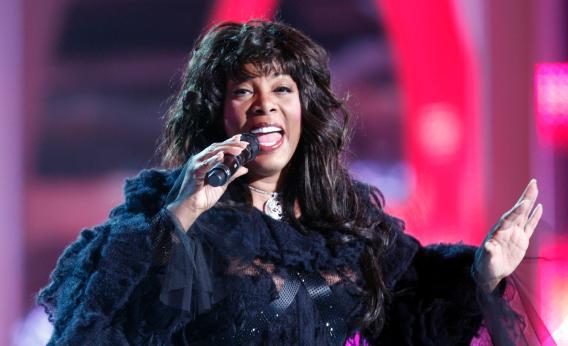“Donna Summer, Queen of Disco, dies at 63.” The headlines today are getting it right—but only half-right. Yes, Summer looked and sounded regal, and she did more than anyone in the 1970s and early ’80s to bring the propulsive, beatific sound of nightclubs to the pop charts. But her music did not begin and end with disco.
Summer’s discography takes in gospel, rock, new wave, synth-pop, New Jack Swing—even showtunes. She began her career as a Janis Joplin-wannabe in a psychedelic rock band. She sang backup for Three Dog Night. While living in Berlin in the early ’70s, she appeared in German-language productions of Show Boat and Godspell.
She was a groundbreaker, teaming with Italian record producer Giorgio Moroder to create some of the most sonically visionary hits of her time, including “I Feel Love,” whose eerie robotic pulse transformed pop for good. Yet Summer had an old-fashioned soul. “I Feel Love” was on I Remember Yesterday, an album that combined modern dance rhythms with the musical styles of the 1940s, ’50s, and ’60s. She told interviewers that Marilyn Monroe was her vocal model on “Love to Love You Baby,” her sexy breakthrough hit. Her signature disco anthems had a classicist feel, with big sing-along tunes that crested over a thumping beat. Her lyrics looked backward, too: “Turn up the old Victrola,” she sang in “Dim All the Lights” (1979). “Gonna dance the night away.”
She wasn’t one of those large-lunged disco divas, urging dancers on with a blasting tone. A Donna Summer vocal didn’t boom or wail; it floated. What she lacked in force she made up for in finesse. Listen to the 17-minute version of “Love to Love You Baby.” Every bit—from curlicuing high notes to low orgasmic groans—is beautifully sung, and sung for a reason.
Summer’s secret weapon was her songwriting. She was a natural melodist and a gifted storyteller. Disco was a genre based on 12” singles, but Summer put out rock-style song suites, concept albums that sprawled out over two LPs with gatefold covers, like Pink Floyd records. The songs were smart and sharply drawn and, above all, sophisticated—the work of a woman who fled a devoutly religious Boston upbringing, moved overseas, and graduated to the highlife. Like all disco, Summer’s music was aspirational, upwardly mobile. It was beautiful mosaic music and beautiful people music—urban and black and gay and a little bit Eurotrash. Summer brought a jet-set gleam to the pop charts.
But her best songs aren’t about glamour. They’re about desolation. Her specialty was the breakup anthem: “Heaven Knows,” “On the Radio,” “MacArthur Park.” If Donna Summer is the Disco Queen, it may be because her songs capture nightlife’s ecstasies and, especially, agonies—the longing for love and sex and communion, the looming threat that, when the party ends, you’ll stagger into the sunlight with no one on your arm. “This is the last dance, last chance for love … I need you by me / Beside me, to guide me,” Summer sang. She made music for Saturday night’s bacchanal, and for Sunday morning’s reckoning, and for every other day of the week, too.
